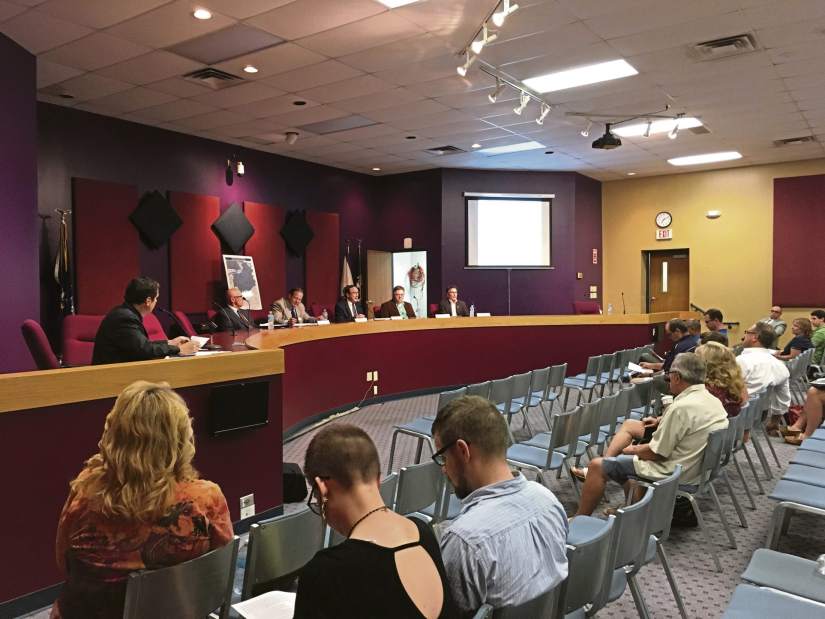Plum residents, experts debate safety of Marcellus shale fracking dump site
Plum's follow-up meeting to the federal Environmental Protection Agency's public hearing in July to express concerns over a proposed injection well was less passionate.
Around 100 residents from Plum and surrounding communities gathered in Plum Council's chambers last week to hear how a five-member panel answered questions about the injection well, which is used in the Marcellus shale fracking process.
Panelists included experts from the oil and gas industry and environmental advocates.
Questions, which were read by a moderator, ranged from wanting to know how much noise pollution caused by increased truck traffic residents can expect to what local governments can do to limit oil and natural gas activity.
But among the biggest concerns were whether injection wells like the one being proposed cause earthquakes and contaminate drinking water.
Dale Scoff, an industry geologist and consultant, said the question of whether injection wells cause quakes depends on an area's geology and if the wells reach pre-Cambrian rock — which can sit to around 18,000 to 20,000 feet within the earth, he said.
“The potential here, and throughout most of Pennsylvania, I think it's very minimal for induced seismicity from these injection well operations,” he said.
Matt Kelso, with environmental group FracTracker Alliance, said he has heard that before.
“This is not an area known for earthquakes, but then again neither was northeastern Ohio,” Kelso said, referencing the bout of quakes that hit Youngstown over several recent years.
Doug Shields, an outreach liaison for Western PA Food & Water Watch, was also not convinced.
“It's a roll of the dice as far as I'm concerned,” he said.
On contaminating drinking water, Scoff said the EPA scrutinizes the possibility of water contamination as part of its permit approval process.
Scoff said he is not aware of any evidence of water contamination being caused by injection wells.
“The main purpose of the whole (process) is not allow (water contamination) to happen,” he said.
Still, John Stoltz, Duquesne University biology professor, advised residents they should test their water if the injection well is permitted, a process that costs anywhere from $400 to $1,400, he said.
Marcellus Shale Coalition President Dave Spigelmyer said well operators in almost all cases pay for a pre-drill water test and share the results with the property owner.
“I'm not aware of the regulations directly on underground injection wells. But I would share with you as an operator, you would want to make sure you protect yourself for liability,” Spigelmyer said.
Penneco Environmental Solutions is seeking a 10-year permit to dispose of fracking water and other fluids from oil and gas drilling operations at a site off Old Leechburg Road near the border with Murrysville and Upper Burrell.
The permit must first receive EPA approval, a process that could take several months, according to EPA spokesman David Sternberg.
“At this time we cannot say whether or not EPA will issue the permit,” wrote Sternberg in an email.
“We will fully read and review each comment and assess if there is any information we did not consider when we issued the draft permit and requested public comments.”
Sternberg added that if the EPA approves the permit, residents can appeal the decision within 30 days.
A similar review process is then incumbent on the state Department of Environmental Protection, according to DEP spokeswoman Lauren Fraley. The agency can also request a public hearing, she said.
Disposal injection wells are used in the oil and gas industry to get rid of water and brine, both byproducts of shale drilling, according to the DEP.
Studies have connected earthquakes to injection wells in Ohio and Oklahoma. In February, a DEP study linked low-magnitude earthquakes in April 2016 in Lawrence County to fracking.
Penneco Chief Operating Officer Ben Wallace has said that the porous nature of sandstone in the region and other factors make it so earthquakes are highly unlikely at the proposed injection well.
Dillon Carr is a Tribune-Review staff writer. Reach him at 412-871-2325, dcarr@tribweb.com or via Twitter @dillonswriting.

